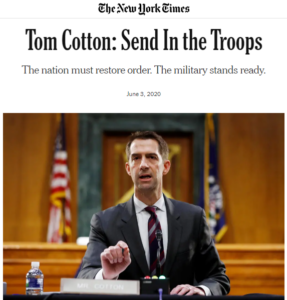Back in June 2020, The New York Times editorial page published an op-ed by U.S. Senator Tom Cotton, a Republican from Arkansas, recommending that troops be deployed to stop the BLM riots. James Bennett, the then editor of the editorial page was fired for printing the piece. He was done in because of a revolt among some 800 staff members at the Times, who were horrified that an opinion piece that they fervently disagreed with should ever see the light of day. But rest assured, it will never happen again.
The paper quickly issued a weaselly statement saying the op-ed “did not meet our standards.” Soon thereafter, the Times publisher, A.G. Sulzberger, asked Bennet to resign – which he did, reluctantly.

We read Bennet’s entire article, and as a service to our readers, here are some passages that jumped out at us:
The bias [at the Times] had become so pervasive, even in the senior editing ranks of the newsroom, as to be unconscious. Trying to be helpful, one of the top newsroom editors urged me to start attaching trigger warnings to pieces by conservatives. . . . I think many Times staff have little idea how closed their world has become, or how far they are from fulfilling their compact with readers to show the world “without fear or favour”. And sometimes the bias was explicit: one newsroom editor told me that, because I was publishing more conservatives, he felt he needed to push his own department further to the left.
Here’s another one about the disdain with which the paper, and its publisher, had for the paper’s own conservative writers:
The Times’s failure to honour its own stated principles of openness to a range of views was particularly hard on the handful of conservative writers, some of whom would complain about being flyspecked and abused by colleagues. One day when I relayed a conservative’s concern about double standards to Sulzberger, he lost his patience. He told me to inform the complaining conservative that that’s just how it was: there was a double standard and he should get used to it. A publication that promises its readers to stand apart from politics should not have different standards for different writers based on their politics.
There’s a lot more in the article that will confirm the suspicions of everyone who’s lamented the paper’s hard-left ideology.
Among the many preposterous complaints by New York Times staff writers was that the Cotton article has “put them in danger.” As Bennett points out, actually it was Senator Cotton, not New York Times writers whose life was threatened when the article came out.
The grand irony of the entire controversy is that in hindsight, Senator Cotton was right to call for troops in some of these inner cities to help keep the protests peaceful and prevent the violent mobs, criminals, and hoodlums from ransacking and burning to the ground minority neighborhoods and small businesses.


